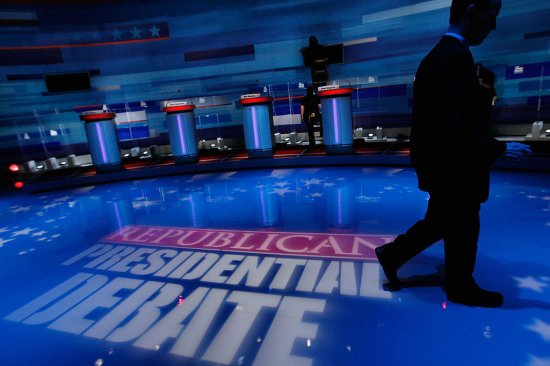
Former President Donald Trump is skipping the debate but his presence will be unavoidable.
The Republican presidential primary began months ago, but Wednesday’s debate may as well be the starting gun. At the first GOP debate, the eight candidates who made the stage will include relative unknowns as well as current governors and a former Vice President. They all will try to distinguish themselves and gain ground on the frontrunner, former President Donald Trump, who is shunning the event.
On the campaign trail throughout the spring and summer, the candidates have worked to promote their personal brands and policy platforms. But on Wednesday, many may be forced to describe and defend specific views and plans for the first time since entering the race. Here are three major issues to listen for.
[time-brightcove not-tgx=”true”]Trump’s indictments
Despite his absence from the stage, Trump will be an invisible presence Wednesday night. On the campaign trail, his rivals have fielded constant questions about his legal troubles. The candidates have mostly split into two camps: those focused on suggesting that the prosecutions are political witch hunts, and those who are highly critical of the former President’s actions.
The first camp includes Florida Governor Ron DeSantis, biotech entrepreneur Vivek Ramaswamy, South Carolina Governor Tim Scott, and former South Carolina Governor Nikki Haley. Some among them, like Ramaswamy, have committed to pardoning Trump if he’s convicted of federal crimes; DeSantis has also signaled as much, though he hasn’t made the same explicit promise. Scott and Haley, meanwhile, have sought to redirect the conversation away from Trump.
In the other camp are former Arkansas Governor Asa Hutchinson and former New Jersey Governor Chris Christie, anti-Trump contenders who have framed the allegations against him as disqualifying. Somewhere in the middle of the two groups is former Vice President Mike Pence, who suggested President Joe Biden was weaponizing the Justice Department following the first two indictments against Trump. Later, after Trump’s third and fourth indictments, which are centered around the validity of the 2020 election results, Pence reaffirmed the election’s security and condemned the former President for raising doubts about it.
Abortion
After the fall of Roe v. Wade last year, many Republicans have been hesitant to directly say whether they would pursue federal legislation further limiting abortion access. Meanwhile, a leading national anti-abortion group, Susan B. Anthony Pro-Life America, has made support for a national limit on abortion after fifteen weeks of pregnancy a litmus test for the Republican nominee.
Despite identifying as “pro-life,” Ramaswamy, Christie, and North Dakota Governor Doug Burgum have all suggested the issue should be left up to the states. This summer, SBA Pro-Life America slammed DeSantis, who signed a six-week ban in Florida, after he dodged a question on federal limits, and implied abortion policy should be left up to the states. Others, like Haley and Scott, have indicated they’d support federal legislation restricting abortion after fifteen weeks without providing more details.
Pence, an evangelical Christian, has staked out the most extreme position on the issue among the eight candidates in the debate, saying he would sign “any pro-life legislation that Congress would take up” and signaling he is willing to pay short-term political costs to restrict abortion. He has called on his rivals to join him in backing a 15-week federal limit, advocated pulling the abortion pill mifepristone from the market, and suggested last month that he would ban abortion even for nonviable fetuses.
The war in Ukraine
As the United States continues to aid Ukraine in its war with Russia, it has become a dividing line among Republican presidential candidates. Both DeSantis and Ramaswamy have suggested that it’s not the United States’ responsibility to continue to put money and resources to boost Ukraine. The Florida governor walked back his characterization of the conflict as “a territorial dispute,” but has continued to suggest he would handle the conflict differently than Biden. Ramaswamy has suggested the U.S. should orchestrate an end to the war through an agreement in which Ukraine would cede territory to Russia and be prohibited from joining NATO.
Others, including Scott, Haley, Pence, and Christie, continue to support aid to Ukraine and have slammed Biden for not doing enough, though they have offered few specifics on how their own plans would differ. Both Christie and Pence emphasized their support for Ukraine this summer by traveling to the war-torn country to meet with Zelensky. Hutchinson and Burgum, meanwhile, have advocated for continuing aid, but with audits to keep better track of how it is being spent.